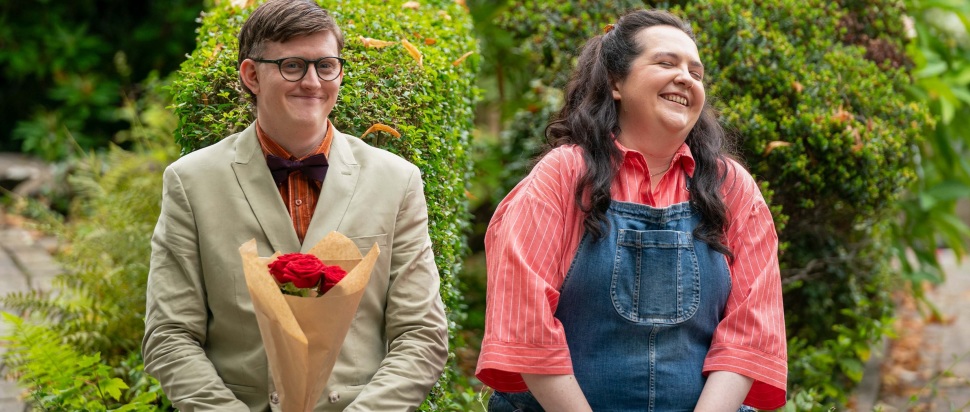Scotland on Screen: Niamh McKeown on Dinosaur
Niamh McKeown tells us how she went from making Black Swan knockoffs with her pals to working with the producers of Fleabag on her first TV show Dinosaur
Dinosaur, a new comedy set in Glasgow by Ashley Storrie and Matilda Curtis, doesn’t look like your typical Scottish sitcom. No shade to the likes of Scots Squad or Two Doors Down, but Dinosaur looks good – cinematic even. The show centres on Nina (played by Storrie) and Evie (Kat Ronney), sisters who share a flat in the West End and have become slightly co-dependent. In episode one, Evie drops the bombshell that she’s soon to be married after her new boyfriend proposed. Nina is not best pleased with the news. “You’ve only known him six weeks,” Nina tells Evie. “You’ve had thrush that lasted longer.” This isn’t just sisterly concern. Nina is also autistic, and the prospect of losing her routine of takeaways on the couch while watching trash TV with her sibling sends her into a tailspin.
One reason Dinosaur is a cut above aesthetically is that it’s more generously funded than most sitcoms made on these shores — it’s produced by Two Brothers Pictures (best-known for Fleabag) in a co-commission between BBC Three and US streaming giant Hulu. But another reason is the crisp direction from young Scottish director Niamh McKeown, who’s making her debut in serial television after a run of celebrated short films.
When I catch up with McKeown a few days before Dinosaur lands on iPlayer, she explains that it’s been a long road to helming high-end TV. She grew up in Dumfries, and says that she initially got into directing for the wrong reasons. “When I was 15, my older brother and his friends were starting to get into cinema, but they were getting into it in that classic Scorsese sense.” McKeown was desperate to be part of the club. “I pretended to have seen Raging Bull, but of course I'd never fucking seen it... I was just trying to be cool, basically.”
Around the same time, McKeown was given a book about a film that her brother and his cinephile gang would have deemed deeply uncool. “It was basically Catherine Hardwick's director notebook for Twilight, so it was some storyboards and other scrapbooky stuff, and I remember thinking, 'This is so interesting.'” Suddenly, cinema felt more accessible. “My brother wouldn’t talk to me because I hadn't seen all these gangster films, but here was a female director laying out how it was done, and I was like, ‘Oh, my God, maybe I could do this.’”
McKeown threw herself into filmmaking. Roping in her pals, she embarked on her first project. “I cast my friend Poppy, who did ballet classes, in a film called Off Point; it was about a ballerina who gets beat up by her boyfriend.” McKeown cringes at the memory. “I think it's such a shame that the first film I ever made was basically about abuse,” she says. “I was like, 'Oh, woman protagonist? Abuse!’ Literally that's what my 15-year-old brain had thought up.”
After secondary school, McKeown got a place on the film course at Napier University. More unsatisfactory films followed, but by her graduate short, Good Girls (2017), McKeown reckons something clicked into place. Rather than making Black Swan knockoffs, she realised her talents resided elsewhere. “It took me three or four films before I realised I wasn’t making dramas, I was making comedies. I knew my films were funny, but I wasn't aiming for comedy, it just naturally happened because I think that's where my instincts lie.”
She describes her filmmaking as all-consuming. “I can sometimes become obsessed with a concept or an image,” she says, “especially when you shoot it and it feels like it's aligning to what you wanted to make. It feels like an addiction in a weird way.” And like many addictions, filmmaking is expensive. While McKeown has been part of several talent development schemes, such as the recently disbanded Short Circuit, they never led to any funding, so her award-winning shorts like Ginny Reaper (2022), in which the grim reaper goes on a disastrous holiday, or Farmland (2019), about some extreme sibling rivalry, were all self-made, with uni friends as cast and crew and her parents mucking in with driving and catering.
It’s certainly not an ideal situation, but there are some upsides. “What I loved about making those shorts was the freedom,” she says. “It wasn't like, ‘Okay, you've been funded and now you have to deliver it.’ It was literally like, ‘Oh no, we didn't fund this. Nobody wants to see it.’”
This freedom probably contributes to the freshness of films like Ginny Reaper. McKeown cites Yorgos Lanthimos’s The Lobster and Emma Seligman’s Shiva Baby as comedies that have influenced her, and like those comedies, her work is playful and idiosyncratic, with jagged edges that haven’t been smoothed in development meetings. And they’re ultimately what’s led to her landing the Dinosaur gig.
The films of Lanthimos and Seligman also hint at McKeown’s own philosophy of comedy. “I think what I like best is sad-comedy or happy-drama or a mix of those things,” she says. “I like when you think you're gonna get one thing but actually some other message is delivered through it all.” The funny, warm, bittersweet Dinosaur certainly fits this bill.
Filmography: Dinosaur (2024), Ginny Reaper (2022), Flooers (2021), Auntie Empire (2020, co-director), Farmland (2019), Good Girls (2017)
Dinosaur is streaming on iPlayer now
